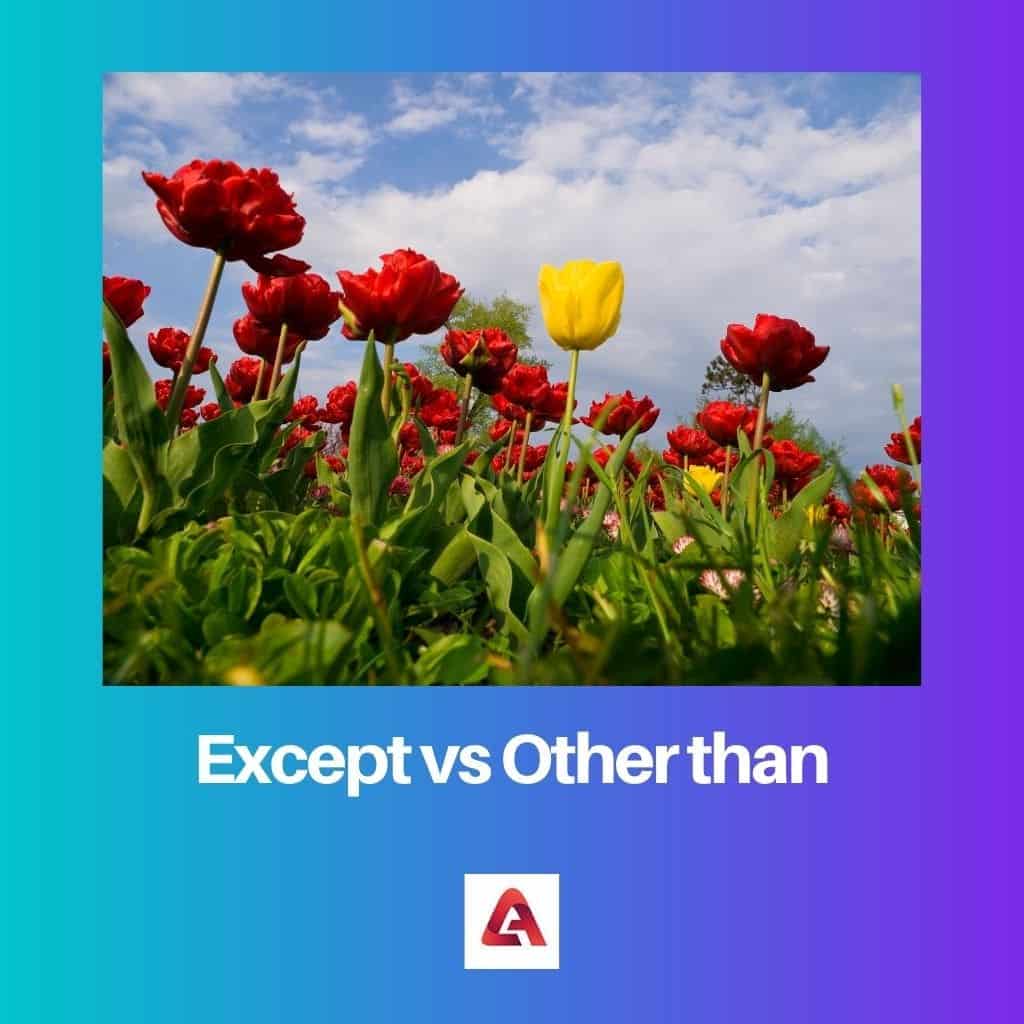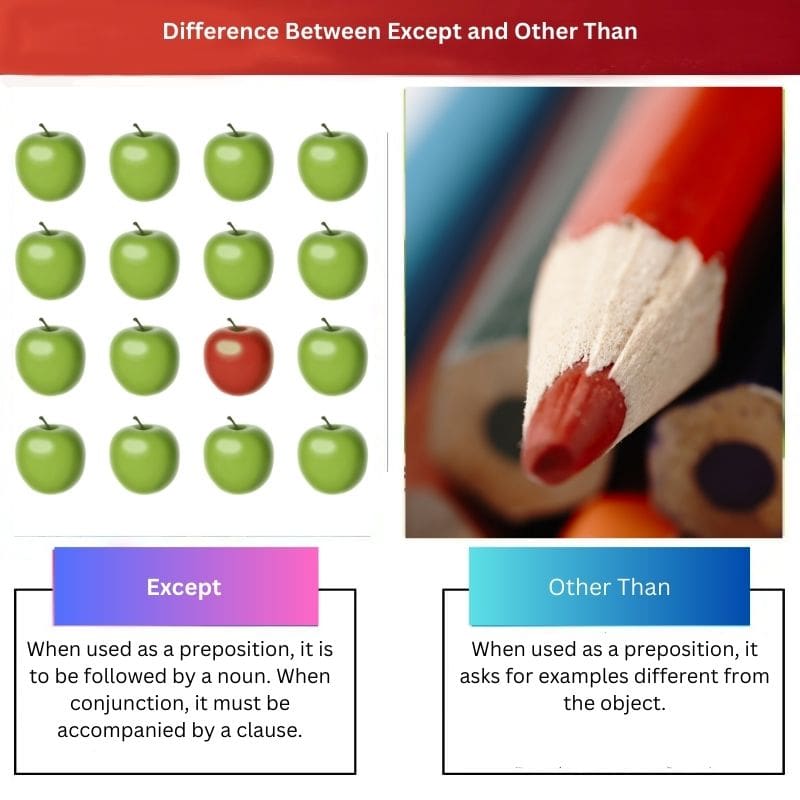Except” is used to introduce an exclusion or exclusionary condition, emphasizing what is not included. It highlights a specific exemption within a set of possibilities. Conversely, “other than” serves to present alternatives or options outside a specified category, focusing on what falls outside of the mentioned group or criteria. While “except” denotes a direct exception within a defined scope, “other than” expands the scope to encompass any alternative possibilities beyond the stated condition.
Key Takeaways
- Except is a preposition or conjunction used to indicate exclusion or exception; other than is a preposition that means different from, distinct, or beside.
- Except emphasizes the exclusion or exception of a specific item or group, other than highlighting a difference or distinction between items or groups.
- Both except and other than convey contrast, but except focuses on exclusion or exception, while other than emphasizes difference or distinction.
Except vs Other Than
The difference between Except and Other than is in grammatical usage. The sentence formation matters, and when both ‘Except’ and ‘Other than’ are in conjunction, their meaning changes slightly. The placement of the words within the sentence varies too.

‘Except’ can be used to ‘not include a particular object or person’. You can also use it in a sentence when differentiating between two objects.
‘Other than’ is a derivative of except and is defined as “providing an exception”. ‘Other than’ is also used to emphasise an object beside the others already mentioned in the sentence.
Comparison Table
| Feature | Except | Other Than |
|---|---|---|
| Meaning | To exclude something from a larger group | To identify something different from something else |
| Emphasis | On the exclusion of something specific | On the difference between things |
| Structure | Often used with a preposition (“except for”) | Can stand alone or be used with a preposition (“other than that”) |
| Formality | Both are formal and appropriate in most contexts | |
| Examples | * “Everyone except Sarah went to the party.” (Focuses on who is excluded) * “I like all fruits except bananas.” (Focuses on the specific fruit excluded) | * “She spoke fluent English and other than that, she knew some basic French.” (Focuses on the difference in language abilities) * “Other than the weather, everything was perfect for the picnic.” (Focuses on the specific element that was different) |
What is meant by Except?
Meaning of “Except”
“Except” is a versatile English word often used to denote exclusions or exceptions within a given context. It serves to highlight what is not included within a specified category, condition, or statement. Understanding its usage involves recognizing its role in delineating limitations or exemptions.
Contextual Usage
In various contexts, “except” is employed to specify conditions under which something does not apply or is not included. For instance, in legal documents, it delineates clauses or provisions that exempt certain individuals or situations from the general rule. In everyday language, it helps in clarifying restrictions or exclusions within a statement or argument.
Emphasis on Exclusion
The primary function of “except” is to emphasize what is excluded or exempted from a particular scenario. It draws attention to the specific instances or conditions that do not conform to the overarching rule or expectation. By highlighting these exceptions, “except” adds clarity and precision to communication, ensuring that the intended meaning is accurately conveyed.
Examples in Sentence Structure
In sentence structure, “except” typically precedes the term or phrase representing the exclusion. For example, “All guests are welcome to attend the event, except for children under the age of 12.” Here, “except for children under the age of 12” specifies the exemption within the general invitation. Similarly, “I like all fruits except bananas” illustrates a personal preference with a clear exception.

What is meant by Other Than?
Meaning of “Other Than”
“Other than” is a phrase commonly used in English to denote alternatives or exclusions outside a specified category, condition, or group. It serves to emphasize what falls outside of the mentioned scope, presenting alternatives or exceptions distinct from the primary subject.
Contextual Usage
In various contexts, “other than” is employed to highlight distinctions or differences by specifying what does not belong to a particular category or condition. It helps in contrasting options, excluding specific elements from consideration, or indicating alternatives beyond the primary focus. This phrase is prevalent in both formal and informal language, contributing to clarity and precision in communication.
Emphasis on Exclusion or Contrast
The primary function of “other than” is to emphasize what is excluded or contrasted with the primary subject. It directs attention to alternatives or exceptions, emphasizing the differences between the primary subject and other possibilities. By highlighting these contrasts, “other than” clarifies distinctions and facilitates a more nuanced understanding of the topic under discussion.
Examples in Sentence Structure
In sentence structure, “other than” typically precedes the term or phrase representing the alternative or exclusion. For example, “I enjoy all outdoor activities other than hiking” indicates a preference for outdoor activities except for hiking. Similarly, “None of the students, other than John, passed the exam” emphasizes John’s exceptional performance among the students.

Main Differences Between Except and Other Than
- Here are the main differences between “except” and “other than” presented in a bullet point list:
- Scope of Exclusion:
- “Except” specifies exclusions within a defined category or condition.
- “Other than” highlights alternatives or exclusions outside the specified category.
- Emphasis:
- “Except” emphasizes what is not included within a set of possibilities.
- “Other than” emphasizes alternatives or exceptions distinct from the primary subject.
- Sentence Structure:
- “Except” typically precedes the term or phrase representing the exclusion.
- “Other than” also precedes the term or phrase representing the alternative or exclusion.
- Usage:
- “Except” is commonly used to delineate exemptions, restrictions, or exceptions.
- “Other than” is frequently used to contrast options, exclude specific elements from consideration, or indicate alternatives beyond the primary focus.
- Examples:
- “I like all fruits except bananas” highlights an exception within the category of fruits.
- “None of the students, other than John, passed the exam” emphasizes an alternative or exception to the general statement about students’ performance.

- https://www.macmillandictionary.com/dictionary/british/other-than
- https://www.merriam-webster.com/dictionary/except

Great explanation of these two words, it’s really useful to know the difference to use them correctly in sentences!
I completely agree with you, Mitchell. This was a very informative explanation on the topic.
I am glad someone finally clarified this. The article was very insightful.
This was an enlightening read. It’s important to understand the intricacies of language.
This article clarifies the subtleties of ‘except’ and ‘other than’ well. Thank you for sharing.
I can’t see the practical application of distinguishing between these terms. Seems overly pedantic to me.
Understanding the nuances of language can make a significant difference in effective communication. This article highlights that well.
I appreciate the level of detail in this linguistic comparison. It’s quite thought-provoking.
I completely agree, Colin. This article presents a comprehensive analysis of language nuances.
I found the comparison very insightful. It provided a detailed understanding of these terms.
Why is this analysis necessary? Seems pedantic and unnecessary.
This analysis provides a deeper understanding of language usage, which is always valuable.
It’s important to pay attention to nuances in language. It’s not pedantic, it’s informative.
Linguistic analysis can be fascinating, and this article certainly delves into the intricacies of language.
This article provided a fascinating look at the subtle differences between these two terms. Very well done.
Absolutely, Alfie. It’s essential to appreciate the complexities of language usage.
This article was very enlightening, I had never considered the nuances between ‘except’ and ‘other than’ before.
I found this article to be very helpful in clarifying these two terms. Thank you for sharing.
It’s always great when language topics are explored in such a comprehensive manner.
Interesting topic. Always good to learn something new.